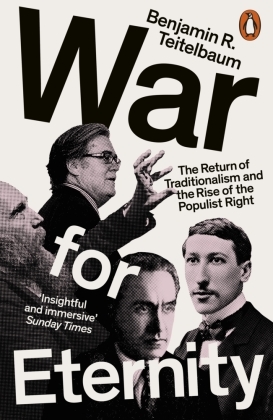War for Eternity - The Return of Traditionalism and the Rise of the Populist Right
| Verlag | Penguin Books UK |
| Auflage | 2021 |
| Seiten | 336 |
| Format | 13,0 x 2,0 x 2,0 cm |
| B-format paperback | |
| Gewicht | 248 g |
| Artikeltyp | Englisches Buch |
| EAN | 9780141992037 |
| Bestell-Nr | 14199203EA |
'Insightful and immersive' Sunday Times
'An intellectual non-fiction thriller' Financial Times
A riveting exposé of the hidden philosophical movement that drives the populist right around the world
Steve Bannon in the United States. Aleksandr Dugin in Russia. Olavo de Carvalho in Brazil. All rising to positions of power in the past decade. All affiliated with an obscure philosophical movement called Traditionalism.
Since its birth in the early 20th century, Traditionalism has defined itself against modernity and Enlightenment values. Traditionalist thinkers celebrated hierarchy, denounced the idea of progress, and regarded liberal secularism, capitalism, and communism as aligned forces working to replace social, cultural and political norms. Ethnographer Benjamin Teitelbaum had been studying Traditionalism for years as a sort of novelty, associated with a restless subsection of the right -- too antisocial for activism and largely without influence. And yet when Steve Bannon entered the White House in 2017, reports suggested he was an avid reader of Traditionalist teachings.
Teitelbaum spent years infiltrating this strange group of self-styled thinkers, gurus and influencers and getting to the heart of their philosophy. Through exclusive interviews and deep historical context, he reveals the radical worldview infusing the thinking of powerful figures today and inspiring a renegade reinterpretation of humanity, geopolitics and history. Fast-paced and gripping, War for Eternity is a riveting expose and a must-read for anyone trying to understand the Far Right's vision to change the world.
Rezension:
Insightful and immersive. . . Teitelbaum argues that Bannon's rise, alongside counterparts in countries such as Brazil and Russia, can be traced to an obscure intellectual current that you have never heard of. . . If you are interested in exploring the intellectual traditions that underpin today's populist revolt, this is a useful place to start Mathew Goodwin The Sunday Times

